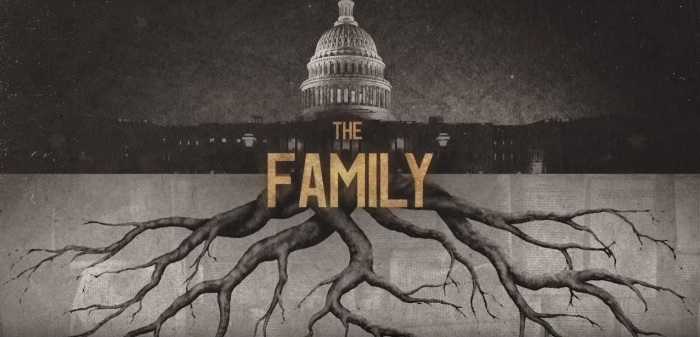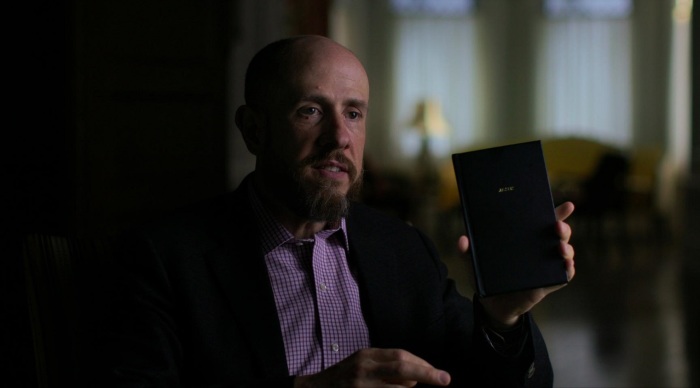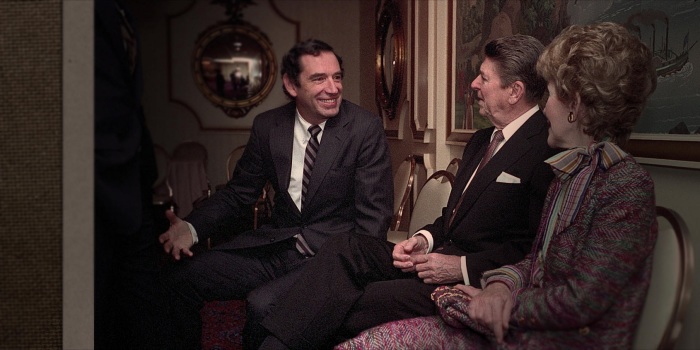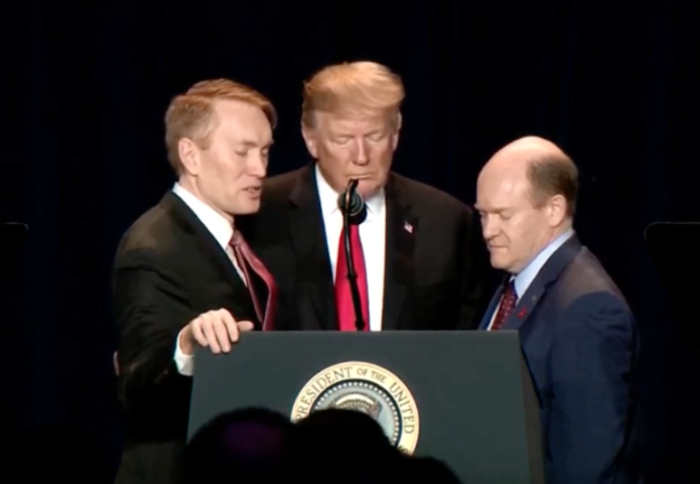‘The Family’ director defends portrayal of Christian group: ‘Good faith’ project, ‘diverse’ views

The director of a Netflix documentary series about a secretive evangelical organization that founded the National Prayer Breakfast rejects critics' accusations that his work unfairly maligns Christians.
On Aug. 9, Netflix debuted a five-part documentary series titled “The Family,” which analyzed the history of a Christian group commonly known by names like “the Family” or “The Fellowship.”
Headed by influential evangelist Doug Coe until his death in 2017, the Family oversees multiple ministries, most notably private small group Bible studies among members of Congress, meetings with world leaders in the Washington, D.C., area and abroad, and the annual National Prayer Breakfast.
The series is based off the work of Jeff Sharlet, a journalist who lived with a small group of men who were part of the Family and met Coe in person.
Sharlet had a book published about his experiences titled The Family: The Secret Fundamentalism at the Heart of American Power, which argues that the group holds troubling levels of influence on national and international events.
Since its release, the documentary series has garnered its share of critics. Denny Burk, president of the Commission on Biblical Manhood and Womanhood, labeled the series “one of the most outrageous pieces of anti-Christian propaganda that I have ever seen.”
“There will be millions of viewers whose opinion of evangelicals will be distorted by this film. It catechizes viewers to be suspicious of Christians and to regard us as a clear and present danger to democracy,” he said.
Skye Jethani, an author, pastor, and host of the Holy Post podcast, took to Twitter to say that he considered the documentary series to be “a hatchet job, misleading, and dangerously biased even if it stumbled into some truth at times.”
However, Jesse Moss, director and producer of “The Family,” rejected the accusations of bias, telling The Christian Post in an interview on Wednesday that the series presented "a diverse set of views" and was done "in good faith.”
“We worked hard to represent a diversity of viewpoints, and it was important for me also to first of all provide room to those who considered themselves to be affiliates or inspired by the fellowship or the teachings of Doug Coe. But also to hear from the people who were critical of the organization and of Doug Coe himself,” Moss said.
“And if there were voices of criticism from within the faith community, to recognize those as well. So I didn't want this to be a simple-minded outside-looking-in critique.”
Moss also told CP that he believes “the series is based on solid reporting.” And said he was “proud of the way we told this story.”
“I think audiences are smart, I think they're are as many people who take issue with this musical choice or that particular editorial decision. There are going to be many more who really found the series compelling, intelligent, challenging,” Moss added.
“The series doesn't need to resolve the question of what and how much influence do they have. I think it provokes a big and almost, in some ways, more important conversation about the teachings of Jesus and how in American democracy, faith and politics intersect.”
From 'The Overnighters' to 'The Family'

Moss told CP that his interest in making “The Family” documentary series came in part from his experiences working on another faith-centered film titled “The Overnighters.”
The 2014 film centered on a Lutheran pastor who opens his North Dakota-based church to less fortunate men in the oil fields area so they could sleep overnight at the facility. However, the pastor’s decision to do so meets strong rejection from his congregation.
Moss, who noted that he was not raised in a religious home, told CP that he was impressed by the faith-based stance of the pastor.
“It was a really remarkably principled decision to really live the teachings of Jesus. Not just for him to preach them on Sunday but for him to practice them,” he said.
Moss read Sharlet’s book on the Family and became “captivated by the story Jeff told,” and “was intensely curious about the organization.”
He also wanted to examine how people in the public square practice their faith, “how the teachings of Jesus are not so theoretical but really lived and expressed in political life.”
“Like all of my films, I had this sort of idea and Jeff's book, but didn't know where it would lead me. I partnered with Netflix and Alex Gibney's company, who I had worked with before, and we embarked on this journey and it was two years from start to finish,” Moss recalled.
Divergent and decentralized

Released in its entirety on Netflix on Aug. 9, each episode of the five-part series was between 40 minutes to an hourlong and covered different aspects and claims about the Family.
Episode one, titled “Submersion,” included a focus on Sharlet’s personal experiences with the Family, including his time at a community called Ivanwald, which was labeled a “frat house for God.”
Episode two, titled “Chosen,” examined the Family’s theological outlook, which reportedly centered on a select few being chosen for power and evangelism from the top-down. It also looked at Doug Coe, who became the leader in 1969.
Episode three, titled “New World Order,” looked at, among other things, the history of the National Prayer Breakfast and other outreach efforts among powerful people, as well as the life of the founder, Abraham Vereide.
Episode four, titled “Dictators, Murderers, & Thieves,” centered on the international efforts of the Family, including meeting with brutal dictators and being an apparent gathering place for conservative Christian politicians from other countries.
Episode five, titled “Wolf King,” looked at, among other things, the Family’s interactions with President Donald Trump and the current state of the Family since the death of its longtime leader, Doug Coe, in 2017.
Overall, the series covered a variety of topics and issues connected or reportedly connected to the Family and interviewed both critics and supporters of the organization.
Grove City College professor Warren Throckmorton, an evangelical activist and blogger, was one of the people who had interacted with members of the Family in the past and was interviewed for the documentary.
Throckmorton and others in the documentary focused on proposed legislation in Uganda that would have implemented strict legal measures, including capital punishment in some circumstances, against homosexuality, noting that the Family had ties among those supporting it in the African country.
He told CP in an interview on Wednesday that he became attached to the project through Sharlet, as both men had actively campaigned against Uganda’s controversial legislation.
“So when it came time for this all to be put together, he suggested me as a person who could talk about my visit to the Prayer Breakfast, my interview with Doug Coe, and my interviews with other fellowship members and leaders,” Throckmorton said.
Throckmorton also talked about his church and state separation concerns over the National Prayer Breakfast, although the event has not been the subject of any serious litigation by church-state watchdog groups.
Regarding his opinion of the overall series, Throckmorton said he “liked it as a film” and “liked it as a documentary.”
“I thought it covered some of the major stories. There are many other stories too that could be covered, but I thought they covered some of the major ones over the last few years,” he said.
"There was, I think, enough detail that people got the idea that there's, at least from my perspective, there's some issues relating to church and state that were provoked by this series, and I think that's a good thing."
When it came to the criticisms of the documentary, Throckmorton acknowledged that people connected to the Family are “divergent” in their views and called the group “decentralized.”
“There will clearly be people who have been involved in it and been touched by it, been helped by it, who don't have any idea about some of the other things,” he explained.
“There may be some other stories that they just had no idea were taking place. I can understand that there would be questions based upon the individual's experience with an organization.”
Throckmorton added that he felt the series “allowed many members of the Family to speak at length about their perceptions and describe the good they believe the group has done.”
“I also am aware of good work that the Fellowship Foundation has done and believe that could continue without sending legislators to do diplomacy and blurring the lines between church and state,” Throckmorton concluded.
In a statement to People magazine about the Netflix series, The Fellowship said: “Though the Netflix docudrama series mischaracterizes the work of the Fellowship and attempts to portray people of faith in a bad light, we are encouraged by how often viewers are introduced to, and challenged by, the person and principles of Jesus, which are at the core of our mission and message.
"Perhaps they will also better understand the integrity and transformational impact of this informal network to encourage everyone in a spirit of friendship and reconciliation to love God with all their heart, soul and mind, and to love their neighbor as themselves.”
Messy and truthful

The documentary noted that the Family has hundreds of small group chapters throughout the United States and abroad.
Near the end of filming, Moss attended the 2018 National Prayer Breakfast. While there, he connected with a representative of a Family chapter in Portland, Oregon.
The final episode, “Wolf King,” showed Moss attending a meeting of the small group, in an experience that the director described to CP as being “very unexpected.”
“This was not at all what I expected. It was far from Washington,” noted Moss, who found it surprising to see a group that was “mixed African-American and white” and “of different social class backgrounds.”
“A conversation dedicated to a discussion of race, which is very unusual in American society. The fact that they challenged me to participate, which I didn't plan to do, but was understandable, given how vulnerable they make themselves,” he continued.
The film showed Moss taking part in the group conversation on race and at one point being put to task over having an all-white film crew. At the end of the meeting, he was arm-in-arm with the group in prayer.
Moss told CP that he considered the segment of that episode one of the “messiest parts of the film,” but also, he hoped, “one of the most truthful.”
“I was really upended by my own expectations, and I felt it was important to present it to the audience in its unvarnished form,” he said.
He also found it interesting that one of the leaders of the Portland group expressed his own critical view of the main Family leadership, yet still supported the overall ministry.
Moss added that he found it “affirming” that the lead members of the Portland group saw his footage of the meeting and “admired and respected the honesty of the depiction.”
“I don't think it’s necessarily the job of the series to reconcile or resolve these questions. This is an organization with a long history and a complex history. And I don't think a four or five-hour series can really answer all of those questions,” Moss told CP.
“As you know, that's not a clear line and it’s a line that's been drawn and redrawn in American history, and so I don't expect one series to settle that debate."



























